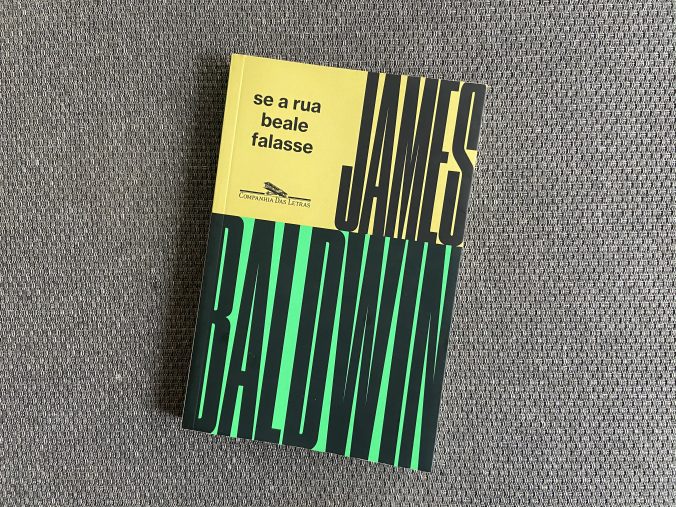[SCROLL DOWN FOR THE ENGLISH VERSION]
James Baldwin escreveu este clássico da literatura americana em 1974, mas a trama de Se a Rua Beale Falasse (Companhia das Letras, 224 páginas) ainda é uma realidade incômoda: Fonny é um jovem negro preso em função de uma falsa acusação de estupro, o que leva sua namorada, Tish, a engajar toda sua família na luta pela liberdade do noivo, ao mesmo tempo em que tem que reunir forças para levar adiante sua gravidez.
O racismo institucionalizado na sociedade americana, mesmo em uma cidade cosmopolita como Nova York, é o pano de fundo desse romance, do qual emergem muitas de suas qualidades. Baldwin trata, em sua narrativa, das muitas injustiças a que são submetidas as populações mais vulneráveis de uma cidade com a qual tinha uma relação de amor e ódio. Sobre algumas, ele não se aprofunda, mas nos faz entrever um buraco fundo. Um exemplo é o sistema prisional. Sabemos pelas visitas de Tish que a prisão terá efeitos indeléveis sobre Fonny, mas nunca ultrapassamos as barreiras de vidro interpostas entre o casal.
Ao tangenciar injustiças sistêmicas, Baldwin escancara um abismo muito mais profundo, o que distancia os jovens de seus sonhos e de seu potencial. O sonho americano é um privilégio de poucos – certamente não ao alcance de Tish e Fonny. Os dois se conheceram ainda bastante jovens, vizinhos no Harlem, um bairro habitado majoritariamente pela população negra. Enquanto a família de Tish é bem estruturada, Fonny tem que lidar com a aversão da mãe, que prefere as duas filhas mais novas, de pele mais clara. A desigualdade, na experiência pessoal de Baldwin, começa em casa e dali se prolonga para a rua.
Em seu célebre ensaio Letter from a region in my mind, publicado em 1962 na revista The New Yorker, o escritor falou precisamente do momento em que ele entendeu o contexto no qual estava inserido – e o risco embutido.
(…) eu fiquei, ao longo do meu décimo quarto ano, pela primeira vez na vida, com medo – com medo do mal dentro de mim e do mal que estava fora. O que eu via ao meu redor naquele verão no Harlem era o que eu sempre havia visto: nada havia mudado. Mas agora, sem nenhum aviso, as putas e cafetões e ladrõezinhos na Avenida haviam se tornado uma ameaça pessoal. Antes nunca havia me ocorrido que eu poderia me tornar um dele, mas agora eu me dava conta que compartilhávamos das mesmas circunstâncias.
No livro, a única resposta ao alcance quando o medo é ser dragado por forças sociais externas é a coragem e a paixão. Fonny reúne esses dois elementos e persegue seu sonho de ser artista. No entanto, quando os dois tentam deixar o Harlem rumo o sul da ilha de Manhattan, onde se concentra a vida cultural da cidade, o casal começa a entender que a opressão ao qual estavam sujeitos têm muitas camadas. Pode estar aparente na dificuldade em encontrar apartamento, no assédio sofrido cotidianamente nas ruas – ou em uma prisão sem motivos, decorrente das atitudes de um policial racista.
A leitura, diante de tantas injustiças, poderia deixar apenas um gosto amargo na boca. Mas não é isso que acontece. Pelos olhos de Tish, Baldwin escreve um lindo tributo ao amor e à esperança. De alguma forma, há alguma ingenuidade nas posturas e decisões de seus personagens, que lhes permitem ter outro tipo de coragem ao enfrentar a vida. Algumas passagens são inesquecíveis.
Acho que não é muito frequente que duas pessoas possam rir e transar, transar porque estão rindo, rir porque estão transando. O riso e o amor vêm do mesmo lugar: mas pouca gente vai lá.
Esse foi meu primeiro – e intenso – contato com a obra de James Baldwin. Enquanto as ruas em diversas cidades dos Estados Unidos eram tomadas pelo movimento Black Lives Matter (Vidas Negras Importam), em protesto contra a morte brutal de George Floyd por um policial em Minneapolis (Minnesota), a leitura de Se a Rua Beale Falasse me fazia pensar insistentemente em duas questões: o quanto este livro, infelizmente, permanece atual, e a certeza de que aquela história não acabaria bem. Sua descrição da pobreza, do racismo, das injustiças em vários sistemas – judicial, prisional, policial – apenas escancaram o pouco que conseguimos avançar nos últimos 50 anos. Quanto ao fim do livro, deixo para o leitor descobrir. Mas é um fato que essa história ainda não acabou.
[ENGLISH VERSION]
James Baldwin wrote this already classic book in 1974, but the plot of If Beale Street Could Talk is still an uncomfortable reality: In the book, Fonny is a young black man falsely accused of rape, which leads to his arrestment. His girlfriend, Tish, engages her whole family to fight for his freedom, while also gathering the strength to carry out her pregnancy.
Institutionalized racism in American society, even in a cosmopolitan city like New York, is the backdrop to this novel, from which many of its qualities emerge. Along the book, Baldwin deals with the many injustices that face the most vulnerable individuals in a city with which he had a love-hate relationship. On some, he decides not to dig deeper, but instead just leave us on the edge of a deep hole. An example is the prison system. We know from Tish’s visits that the prison will have an indelible effect on Fonny, but we are never invited to cross over the glass barriers interposed between the couple.
By exploring those systemic inequalities, Baldwin opens up a much deeper abyss, which distances young people from their potential. The American dream is a privilege for just a few – certainly not Tish and Fonny. The couple met still young, as neighbors in Harlem, a part of New York inhabited mainly by the black population. While Tish’s family is well structured, Fonny has to deal with the aversion from his mother, who prefers his two lighter-skinned sisters, more suited for the life that she imagined for herself. Inequality, as Baldwin’s faced in his own personal experience, starts at home and then goes to the street.
In his famous essay Letter from a region in my mind, published in 1962 in The New Yorker, Baldwin spoke precisely of the moment when he understood the context in which he was inserted – and the risk embedded.
(…) I became, during my fourteenth year, for the first time in my life, afraid—afraid of the evil within me and afraid of the evil without. What I saw around me that summer in Harlem was what I had always seen; nothing had changed. But now, without any warning, the whores and pimps and racketeers on the Avenue had become a personal menace. It had not before occurred to me that I could become one of them, but now I realized that we had been produced by the same circumstances.
In the face of so many injustices, the novel could just leave us with a bitter taste in our mouths. But that is not what happens. Through Tish’s eyes, Baldwin writes a beautiful tribute to love and hope. Somehow, there is some naivety in the characters that he builds, in the way that they make decisions and go on to face life as it is. It takes courage not to think so much about the dangers lurking. Some passages are unforgettable, such as the one in which the couple is laughing about Fonny’s parent’s sexual life – and then about their own:
I guess it can’t be too often that two people can laugh and make love, too, make love because they are laughing, laugh because they’re making love. The love and the laughter come from the same place: but not many people go there.
This was my first – and intense – encounter with the work of James Baldwin. While the streets in several cities in the United States were taken by the Black Lives Matter movement, in protest against the brutal death of George Floyd by a policeman in Minneapolis (Minnesota), reading If Beale Street Talk got me questioning two things: how much of this book, unfortunately, remains a reality, and the certainty that the story would not end well.
His description of poverty, racism, injustices in various institutions – justice, prison, police – reveals the little that we have been able to achieve in the last 50 years. As for the end of the book, I leave it to the reader to find out. But it is a fact that this story is not over yet.
Tainara Machado
Últimos posts por Tainara Machado (exibir todos)
- 5 melhores leituras de 2020 - 20 de janeiro de 2021
- [Resenha] A Vida Mentirosa dos Adultos, por Elena Ferrante - 21 de outubro de 2020
- Vamos falar sobre a Amazônia? - 7 de outubro de 2020


![[English ⬇️] “Estes são, acima de tudo, ensaios pessoais: pequenos por definição, curtos por necessidade”. “Intimations” é uma coletânea de ensaios de Zadie Smith escrita durante os primeiros meses de isolamento. Nem preciso dizer que essa leitura é extremamente reflexiva e tocante, certo? Tenho certeza – assim como Smith também tem, segundo o que ela mesma esclarece no prefácio – que ainda há muito a ser escrito sobre esta crise sem precedentes para nossa geração. Mas isso não muda o fato de que vale muito a pena ler este livro, especialmente se você não quer esperar mais para dar ao menos um pouco de sentido ao caos. Embora este livro não pretenda explicar nada, ele acaba fazendo isso porque Smith é incrivelmente habilidosa com as palavras. Ela consegue nomear os sentimentos que dominaram o mundo desde o ano passado, apenas observando atentamente o que a cerca e colocando suas impressões em palavras. Da tendência do bolo de banana à consciência do privilégio de classe e a reflexões sobre o assassinato de George Floyd, Smith apresenta histórias curtas com as quais você certamente se identificará, já que todos nós temos vivenciado essa terrível experiência da pandemia.](http://www.achadoselidos.com.br/wp-content/plugins/instagram-feed/img/placeholder.png)
Deixe uma resposta